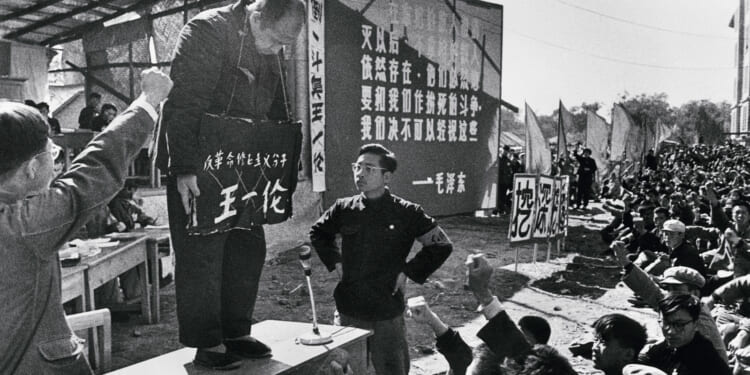
[Order Michael Finch’s new book, A Time to Stand: HERE. Prof. Jason Hill calls it “an aesthetic and political tour de force.”]
As has been made shockingly clear since the assassination of peaceful activist Charlie Kirk, Democrats now don’t even bother to rein in rhetoric that celebrates and incites violence against their political opponents, whom they justify hating and killing by declaring them fascists and Nazis. Veteran Democrat strategist James Carville’s recent outburst, for example, demonstrates that they are ready to bring back the most disturbing excesses of Mao’s Cultural Revolution.
Wednesday on his Politics War Room podcast, the 80-year-old cadaverous crank Carville unleashed a chilling vision for retribution against those he deems “collaborators” with President Donald Trump. “You know what we do with collaborators?” Carville asked co-host Al Hunt while discussing the Trump administration’s higher-education reforms. Trump has moved to reward colleges that commit to ending institutional practices targeting conservative viewpoints.
“My fantasy dream is that this nightmare ends in 2029,” Carville continued:
I think we ought to have radical – I think they all ought to have their heads shaven. They should be put in orange pajamas and should be marched down Pennsylvania Avenue, and the public should be invited to spit on them. The universities, the corporations, the law firms, all of these collaborators should be shaved, pajamaed, and spit on.
Carville clarified that he wasn’t referring to long-standing defense contractors like Lockheed or firms already tied to government work, emphasizing that his anger was directed at those who “chose to bend the knee to this guy.”
“The idea is you have to pay more because you did this, because it is the only way that you’re going to discourage future collaborators in the United States,” he added. “It’s a moral judgment.” He went on to condemn Trump as “a tyrant” who “has no use for democracy. He has no use for the values of this country. You are collaborating with this, and it will bring eternal shame to your company.”
In April, Carville had compared cooperation with the Trump administration to Nazi collaboration during World War II, invoking the August 1944 liberation of Paris when French citizens violently turned on collaborators in the streets. At that time, Carville said coyly, “I’m not saying that these people should be placed in pajamas and have their head shaved, marched down Pennsylvania Avenue and spit on. I’m not saying that, but I’m saying that that did happen.”
Six months later, Carville has apparently changed his mind or decided to be more honest about his totalitarianism.
This is not some unknown, fringe radical blowing off steam on social media. James Carville has been one of the most (inexplicably) respected Democrat strategists for decades. He is a constant guest on Left-wing media, where he is given full, unchallenged rein to unload his often profane, opinionated rants. And this was not rare hyperbole on his part, either; Carville spews demonizing propaganda every time he opens his mouth. Earlier this year, for example, the Democrat pundit warned Trump’s second term was “the most serious crisis that this country has ever faced” and claimed “the entire idea of the United States is in jeopardy.” In March, he went further on CNN, suggesting Trump is “actively trying to destroy” the United States because “it’s possible he hates our country.”
But even by Carville’s low standards, his latest comment is a shockingly vicious blueprint for humiliation that evokes the darkest chapters of totalitarian history, particularly the Chinese Cultural Revolution. His “fantasy” betrays a sick impulse that is intrinsic to Left-wing politics—an intolerant hatred that views political opponents not as fellow Americans but as enemies to be crushed.
To grasp the depravity of Carville’s proposal, one must first confront its visceral imagery. Heads forcibly shaven, bodies clad in the garish orange of prison garb, victims paraded through the streets of Washington like criminals in a dystopian spectacle, pelted with spittle from a jeering mob. This is not the language of democratic debate; it is the theater of vengeance, designed to break spirits and deter dissent through terror. Carville justifies it as a “moral judgment” to “discourage future collaborators,” echoing the very logic of inquisitors who rationalized torture as societal hygiene.
Invoking such rituals, he channels the mass persecutions of Mao Zedong’s Cultural Revolution (1966–1976), where ideological purity was enforced through public shaming and ritualized abuse. During that cataclysmic decade, millions of Chinese intellectuals, officials, and ordinary citizens labeled as “counter-revolutionaries” were subjected to “struggle sessions” These were brutal public interrogations where victims were forced to confess fabricated sins, endure beatings, and suffer degradations like head-shaving and parading in dunce caps or tattered clothing while crowds hurled insults, stones, and excrement.
The abuse heaped upon those persecuted in the Cultural Revolution was not mere spectacle; it was a systematic engine of terror that claimed an estimated 1 to 2 million lives and scarred generations. Families were torn apart as children denounced parents, and “enemies of the people” were driven to suicide or madness. Consider the case of revered author Lao She, who in 1966 was dragged to a Beijing park, forced to kneel, and beaten—his “crime” being insufficient Maoist fervor. Lao She is believed to have drowned himself in a canal, having been unable to rid himself of the shame and humiliation. Or the countless academics and artists whose heads were shorn, bodies daubed with ink, and marched through streets amid cries of “Down with bourgeois dogs!”
These rituals purged perceived threats and enforced conformity through fear. The public nature of the abuse turned personal humiliation into collective catharsis for the mob. Carville’s fantasy transplants this Maoist playbook to America’s capital, substituting Trump for the targeted “Four Olds” – old ideas, old culture, old customs, and old habits – and corporate executives for intellectuals. In both, the “collaborator” label justifies extrajudicial cruelty, erasing the line between political disagreement and existential enmity.
Carville’s – and the Democrat Party’s –intolerant hatred of their opponents is the real threat to the republic. Unless we can purge that from the political landscape and – like Charlie Kirk –reaffirm that reclaiming our greatness lies in dialogue, not degradation, then our ongoing hot civil war can only escalate.
Follow Mark Tapson at Culture Warrior.
















